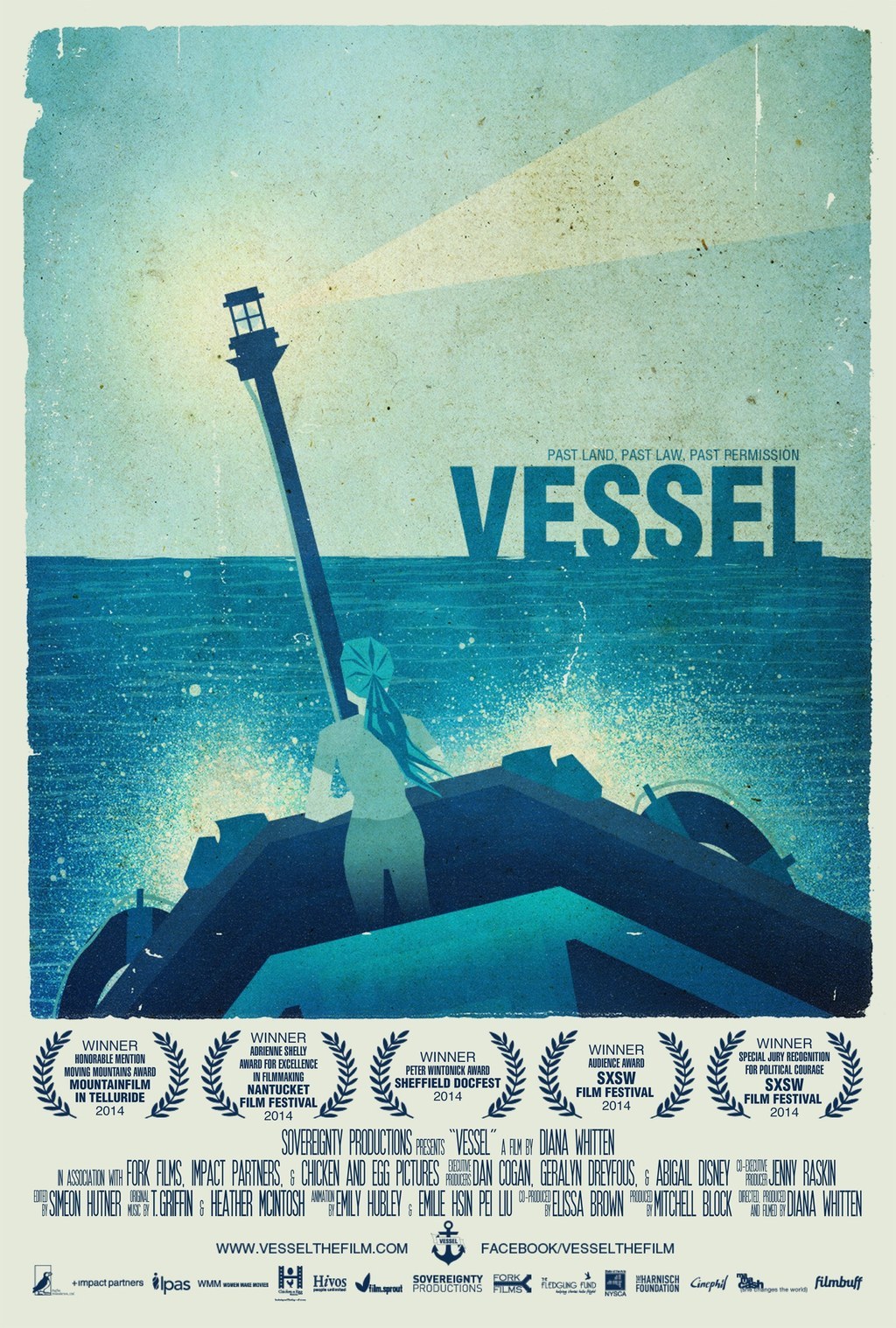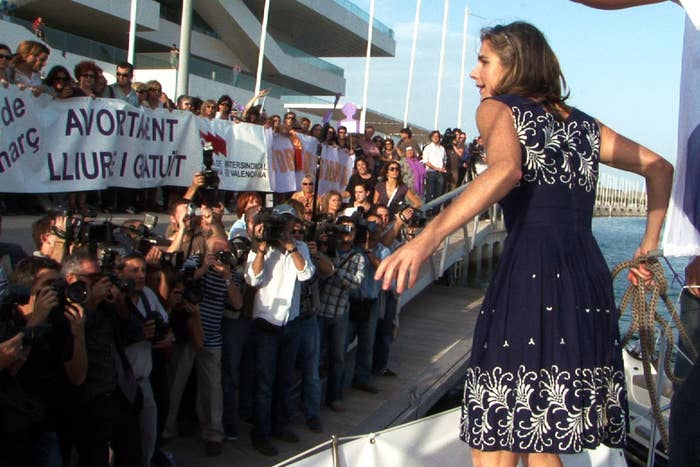
Though abortion is largely illegal in many parts of the world, Rebecca Gomperts, M.D., a doctor and women's rights activist in the Netherlands, found a way around restrictive anti-abortion laws: by sailing a mobile abortion clinic.
Gomperts' project, Women on Waves, launched in 2000 and has provided legal abortions in international waters in areas where abortion is illegal, giving women information on how to safely induce abortion using World Health Organization-sanctioned protocols with pills. Her efforts were documented by first-time director Diana Whitten in Vessel, a new movie that follows Gomperts and her controversial global movement — including Women on Web, the online incarnation of Women on Waves — from its inception through today.
BuzzFeed News spoke with Whitten (who also co-produced the documentary) and Gomperts about Women on Waves, the challenges and setbacks they faced, and the grassroots campaign efforts documented in Vessel, which will get a limited release starting Jan. 9.
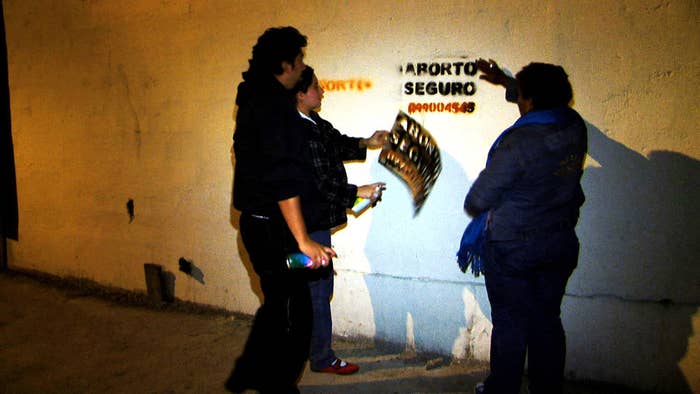
Rebecca Gomperts
How long did it take to bring Women on Waves from an idea into a fully executed mission — securing the ship, recruiting others to help, etc.?
Rebecca Gomperts: The first time that the idea came into existence was in 1997, when first sailing with Greenpeace. [Ed.: Gomperts sailed with the Greenpeace ship Rainbow Warrior as its doctor and as an environmental activist.] There was just the idea. From that moment, I started talking with a lot of people — I even went to sailing school to understand more about ships. And I met with women's organizations, I spoke with the abortion rights community in the Netherlands, and it was clear that we needed to have at least a proper legal investigation, which was not that easy because it cost money. The campaign was launched in 2001. So about three and a half years.
What was the ship's first stop in Ireland in 2001 like?
RG: Everybody was just very excited and very anxious. We had no idea what was going to happen, so it was like a roller coaster. The preparation for this first campaign, it was within half a year: In December, I knew I had the funds, and then we planned the campaign for June. It was a lot of work. And I guess it's a good thing not to know what's going to happen. It was overwhelming for everybody.
What would you say has been most challenging part of this mission?
RG: It's hard to say. The challenges come one by one, so it's about overcoming them one by one or going around them one by one. Each time it's something else that you never saw before, so each time it's something else that needs to be solved. The challenges are not comparable. I think the most important one was really to go from this moment when we'd been sailing but we hadn't been able to do what we said we were going to do — that was in Ireland [where the ship was stopped and unable to provide abortion services] — to go to Poland and to really provide the medical abortions to women. That was an enormous important step, because we couldn't fail twice. We would lose all credibility if we wouldn't have been able to pull it off then. So I think that was really important for us.
Abortion was legalized in Portugal in 2007, and the laws in Spain changed a few years later — do you think your work made a big impact on changing those laws?
RG: I think in Portugal it did. I think in Spain, no; I think the campaign helped to kind of put it back on the agenda, but I think this process was already ongoing. But in Portugal, it definitely made a difference. It would have happened probably eventually, but it could have taken another 10, 20, 30 years. And I think the campaign with the ship really was the catalyst. It was one of the main issues in the election.
The change in Portugal, I think it was the perfect storm — all these elements came together. And I think that the ship had been catalyzing that moment — there were some women's groups that were working on legalizing abortion, [but] they were not very strong yet. And with the coming of the ship there was another very young group called Doctors for Choice in Portugal. During the legalization of abortion campaign, they became the main spokespersons for abortion. It was the first time doctors were supporting abortion rights, and so it was the perfect storm that happened [along] with the ship. And that was amazing.
In Vessel, you go to Africa and you're part of a grassroots campaign to show women how to obtain the misoprostol pill, which is used to induce abortion. How effective has that been there?
RG: This group started their own pharmacy. I think what was important is that we were the first ones who were actually willing to really train the people, take it out of the medical professionals' [hands] and to put it back in the community ... If you want women to have safe abortions, you have to give them the tools themselves and take it away from the doctors. That said, when there is a complication, we need doctors. But that's only when there's a complication. Normally, the medical abortion is similar to miscarriage — and women have miscarriages without doctors, without hospitals, all the time. So it's a very natural process. If there's a complication or a problem, of course you need doctors. And I think that to be able to make that distinction, on Women on Waves, we were really important in getting other organizations to follow up on that.
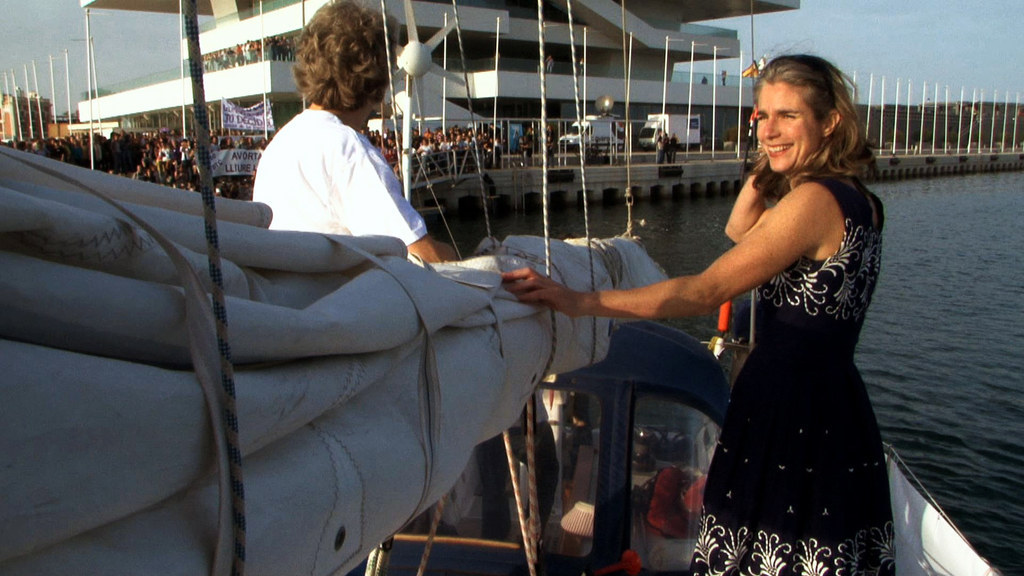
Does the boat still run, or are services only through Women on Web now?
RG: Oh, yes, the boat still runs. The boat campaigns every few years, and we're just waiting for the next opportunity to come along. It has not stopped. They [Women on Waves and Women on Web] have different goals and different outcomes. The ship is there to [make] a very hidden problem visible, and helping women at the same time. Women on Web is about providing services, really, and sometimes it can be used also by local organizations to break the taboo — so I think that actually in order to break the taboo, you have to provide the services. And you have to have people that come out and use it. And the ship is a very useful way to do that as well.
What can people do to help with your mission?
RG: One of the things that somebody can do — and I think this is something that all the organizations that fight for abortion rights in the U.S. should do — is to find out which are reliable online sources that are actually providing women with medical abortions in the U.S. There are some online pharmacies that do medical abortions; we don't know which are reliable ones. But if someone really wants to help women in the U.S., that's what they should do — and then they should publish this [information] online, so women know where they should go. That's one thing, which is very concrete.
The problem is, states in the U.S. that decide abortion is illegal, there will be consequences sooner or later: Women will die or will suffer health consequences when they don't have access to safe abortions. And to prevent that, we need to make sure women know the proper sources online.
The second one is that, for Women on Web, it's very important that women all around the world know that this exists. The hardest part is really, how do women find you? If people have their own sites, they can link to Women on Web. They can also try to find, for example, these forums where people are trying to look for help with pregnancy, about Women on Web — they can do it through social media, Facebook, Twitter, whatever ... [And] when people go on holiday, they can print out the little stickers we've made with information about how they can do medical abortions themselves. It's another way of informing that safe medical abortions exist. Once people start sharing this information, women all around the world will know.
Diana Whitten
What inspired you to connect with Rebecca Gomperts, and what prompted you to document Women on Waves?
Diana Whitten: Eight years ago, I was in an international studies master's program and I was reading a lot about offshore spaces, which traditionally have been occupied by criminals and criminal activity — people who are interested in using the space for personal gain. And this was one of the most compelling rare examples that I had ever heard of: someone occupying that space with a social justice agenda. I thought it was such an interesting political construct. So I think my initial interest in her work was intellectual, aside from having had a long history of being pro-choice and going to rallies when I was a young girl through college. So I went to find her. Basically, I rented a camera, and with a good friend who was an associate producer, we bought a ticket to Amsterdam and met with Rebecca, who, at that point, was pretty used to media showing up at her door — this was in 2007 — so she humored us and probably thought we would not be back after our first interview.
I think it was a surprise to both of us that eight years later, we're still doing this! My connections to the material became much more emotional over the course of filming and witnessing their work, especially when I was researching the letters from women [inquiring about abortions] — just to read through the amount of requests for help they get from so many countries around the world. And not only that, but the dedication of the correspondence and the activists in the correspondence — some of these back-and-forth conversations with women who are basically taking the pill as they're coaching them through this in real time. It's a lot of back and forth, it's a lot of time, and it's real dedication on the activists' part to make them feel less alone.
So you filmed this over nearly a decade?
DW: I started in 2007, but the film follows them from 2001 on ... Rebecca had let us know that there had been filmmakers and non-filmmakers — people recording the earlier campaign — so all of the footage from Ireland and Poland and Portugal [in the earlier years] was actually donated to the film from people who were there. So we could really tell the entire arc of their story.
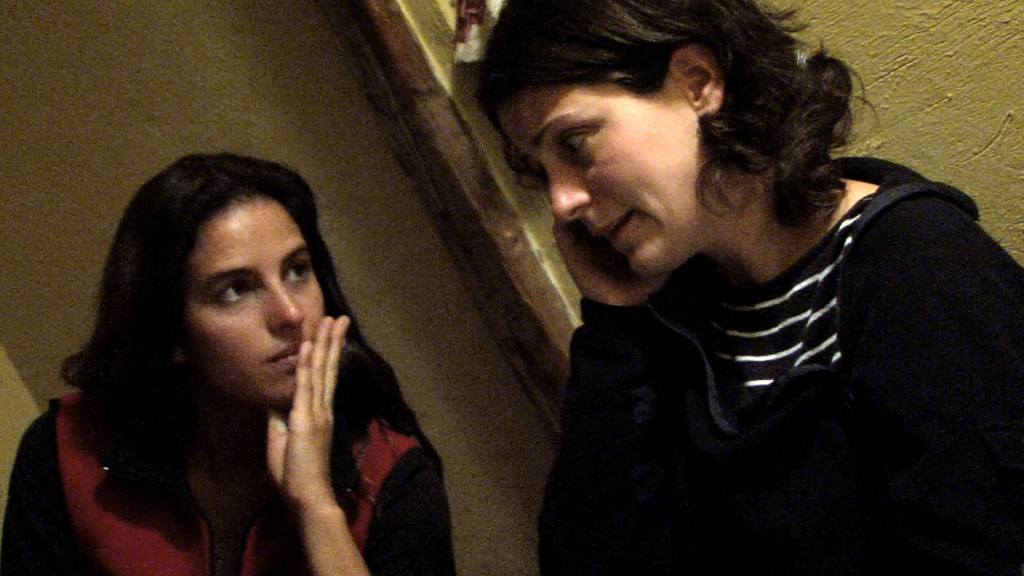
For you personally, what was the most challenging aspect of filming this documentary?
DW: When I started this eight years ago, the landscape in the U.S. was very different. It was a very different political landscape, and the knowledge about the abortion pill was much less. So I found myself pitching a very controversial film with a very unpredictable main character — a film by a first-time filmmaker — to a group of potential funders that were a little bit concerned ... And what we've seen since then, unfortunately, is a mobilized attack on abortion rights in the States. And the consequence of that, for better or for worse, has been much greater knowledge about the abortion pill and how women are using it around the world, both in clinic situations and off-label. In that sense ... it was hard to get the film funded and get the film made, and that's one of the reasons why it took so long.
But I think what's interesting, because of the shift here [in the U.S.], is that the story has become a much more local story. When we first started, I anticipated all of our outreach being outside of the United States. And what we're finding now is that, because women are finding the pill [misoprostol], and so many women here don't have access to clinics, despite Roe v. Wade, they are resorting to finding the pills in the same way that women around the world, where abortion is illegal, are finding the pills. So it's a local story now — and that was not our original idea.
Were you ever worried about the legal implications of getting involved with this project?
DW: Yes, it definitely crossed my mind, and we spoke with a lot of lawyers. Rebecca has worked hand in hand with security and lawyers — there's never a campaign that doesn't have security attached to it ... I wanted to make sure we never put anyone in danger, myself included, and that the information we were giving about the pill in the film wasn't putting anyone at risk. So we really spent some time with our lawyers making sure we covered our bases.
How did you decide when to stop filming? Was it difficult?
DW: It was very difficult! The organization is ongoing. How do you end the story about an ongoing organization? My editor and I would joke a lot about the 13-hour miniseries we were constructing, because we have so much good material. They're a really unpredictable, interesting, charismatic group of people that take a lot of risks — so their story stays interesting.
But I felt that by the point where we did end the film, the organization had gone through enough iterations to really be a sustainable model. And [Gomperts] had set to do something that she achieved, even though it was in a much different design than she originally envisioned ... The ship had been stopped so many times, by various antagonists, and with each antagonist that came along, it really was about how she incorporated that and made her original mission stronger with that, because of that antagonism. So I feel that when the film ends, Women on Web is the sustainable, underlying functioning part of the organization underneath the sort of spectacle of the ship that is Women on Waves, and it works. And it's interesting. And also, Rebecca has sort of, as a character, simply done an arc in that she went from being very green in the beginning to learning how to train others to be a part of the movement.
The film was screened over a weekend in December in Sweden and [the screening] was attacked with a smoke bomb. Can you tell me a little bit about what happened?
DW: It's terribly upsetting. Essentially a small reproductive rights organization called RFSU screened the film ... and it was attacked by three masked men who threw a smoke bomb into the room where the screening was happening and trapped the audience inside. Everyone panicked. The good news is that everyone made it out fine; everyone was OK. A little girl was there and she had to go to the hospital, but she's also fine. It's really terrifying.
We've always been concerned with security over the film, even when we first premiered back in March, in Texas, and there was a lot of talk about whether or not we would need security there, because it is a button-pushing film. And since our premiere, we've yet to have any kind of protest even. So on one hand, it had crossed our mind that we might encounter this at some point, but I had not anticipated terrorism.
The Sweden episode aside, what has been the general reaction to the film thus far?
DW: It's actually been beyond my wildest dreams. It's been embraced by the film community; it's sparked a lot of interesting conversations with reproductive rights organizations that we're working to partner with so they can use the film in their own agendas. We've had a community screening tour that I'm working on with Film Sprout, and I think they've booked nearly 50 screenings around the world already, and that's just in the first couple months of booking. The fact that we're at the IFC Center and several other theaters across the country for a limited theatrical [release] and the fact that we're going to be on all of these VOD platforms, I'm thrilled!
How can people get involved with the film on an activist level?
DW: We are planning a big campaign to go along with the release to get people involved in the social action part of the film; any student group or nonprofit can screen the film [by emailing vessel@filmsprout.org]. Also, in terms of outreach — the animations in the film that contextualize the abortion pill, they were designed as something we could use for outreach efforts.
Vessel opens in New York City at the IFC Center on Jan. 9 and will be available on VOD platforms starting Jan. 13. For more information, visit vesselthefilm.com.
